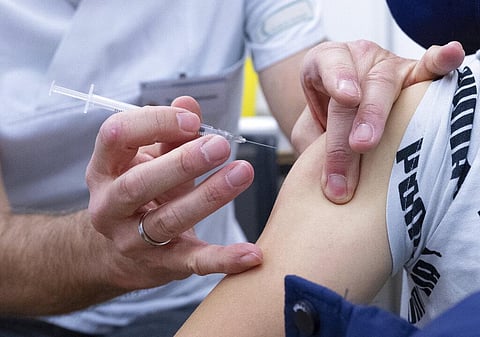

BERLIN: Germany is scrambling to procure more vaccines to fuel what the new health minister on Thursday called a "very offensive" and fast booster strategy that would leave the country better prepared for the onslaught of the new omicron variant.
Germany on Wednesday administered nearly 1.5 million shots, its highest one-day total so far.
As its vaccination campaign has revved back up, an average of some 988,000 people per day have been vaccinated over the past week.
The proportion of Germany's population of 83 million that has been fully vaccinated now stands at 70% , a number that officials, who had set a minimum target of 75%, aren't satisfied with.
And 27.6% also have received a booster shot, a figure that is rising quickly.
Health Minister Karl Lauterbach said that "we will try with a very offensive, fast booster strategy to keep the omicron variant as small as possible to avoid overloading the health system and possibly society as a whole."
But Lauterbach told reporters he wasn't satisfied with an inventory of vaccine delivery plans for the rest of December and next year's first quarter after he took office last week in the new government of Chancellor Olaf Scholz, because "it simply isn't enough for such a vaccination strategy."
With those delivery numbers, "the booster campaign would be finished at the end of March, and we can't work with that," Lauterbach said.
He said his ministry launched efforts to remedy that on Saturday, and has secured the European Union's approval to get the delivery of 35 million doses from Moderna moved forward.
Lauterbach said he is negotiating with other countries, including Romania, Poland, Portugal and Bulgaria, to secure more vaccines.
Germany also hopes to get doses of the BioNTech-Pfizer vaccine that have been adapted to the omicron variant in the first quarter.
The minister said he expects that "the booster vaccination and possibly also a fourth vaccination will be the central pillars of a successful strategy."
Omicron hasn't yet become a major factor in Germany, unlike in Britain.
But the country is only now seeing a wave of infections caused by the still-dominant delta variant, its biggest so far, recede slowly.
There are signs that restrictions imposed in recent weeks are beginning to have an effect.
Lothar Wieler, the head of the Robert Koch Institute, Germany's disease control center, said that "a few hundred cases" of omicron have been registered so far, and it has been found in all 16 German states.
Wieler warned that Germans need to make sure the Christmas period doesn't provide a "kick-start for omicron," recommending that they spend the time with close family and reduce their contacts.
Wieler's institute said that Germany has seen 340.1 new coronavirus infections per 100,000 residents over the past seven days, down from 422.3 a week earlier.
There were 56,677 confirmed new cases over the past 24 hours and 522 more deaths, bringing Germany's toll in the pandemic so far to 107,202.
Portugal's prime minister says he intends to keep tighter COVID-19 border controls in place beyond their planned end on January 9 because of the threat from the highly infectious new omicron variant.
He says Portugal is also likely to provide another booster shot next year for already vaccinated vulnerable people who are receiving a booster after having the COVID-19 jab earlier this year.
Portugal requires a negative test for all passengers on arriving flights.
Prime Minister António Costa told reporters Thursday that border controls will continue beyond January 9 and could even be tightened.
He didn't elaborate.
The government had previously announced a "contention week" from Jan. 2-9, when working from home is mandatory and schools will be closed.
Indonesia has detected its first case of the omicron variant of the coronavirus in a cleaning worker at a hospital in Jakarta, the country's health minister said Thursday.
The patient has no symptoms and is being quarantined at the Athlete's Village emergency hospital, where the patient worked.
The government created the facility in March 2020 to treat COVID-19 patients and as a quarantine venue for Indonesians returning from abroad.
Indonesia's Health Minister Budi Gunadi Sadikin said the case was found on Wednesday, and he urged people to continue following recommended health protocols, including wearing masks and maintaining physical distance.
He also called for increased testing and to accelerate the country's vaccination programme.
Indonesia, as of Wednesday, had recorded more than 2 million COVID-19 cases and more than 143,000 deaths.
During the peak of the last surge in July, it hit 56,757 cases per day as hospitals became overwhelmed by sick patients and ran out of beds and oxygen supplies.